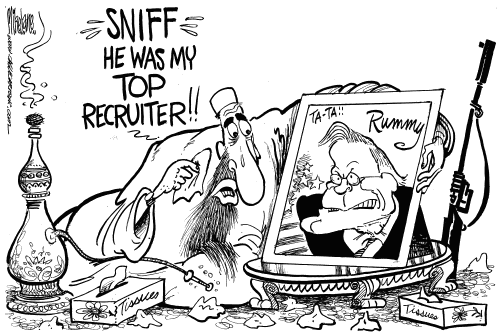
I've been meaning to write this spotlight for several months now,
such that most of my close associates likely know everything I'm about
to say. When the Syrian refugee crisis started escalating I had planned
an article (self-evidently postponed) about the abysmal international
response, but in the wake of Paris and Beirut I feel this is again the
more topical.
Remember al-Qaida? That nebulous organization said to have sleeper cells
all over the world, constantly plotting suicide bombings against pretty
much every major commercial centre in the western hemisphere? You know,
America's Public Enemy №1? It seems ever since the so-called Islamic
State of Iraq and al-Sham 'broke off' from headquarters, the 'original'
hub of Middle-Eastern extremism has rapidly faded into irrelevance. Did
the ISIS defection bleed out Zawahiri's best? Has it simply gone
underground to let al-Baghdadi take international flak? Al-Qaida used to
pump out media spots almost every other week; nowadays the best we hear
is African bandits "affiliated with" it.
Whatever happened to 'the Base'?
Or did it even exist in the first place?
Cast your mind back to 2004: NATO was garrisoning Afghanistan and the
United States was settling into the occupation of Iraq. Though in the
coming years insurgent groups would mobilize in both countries, the
extremism that had stunned the world in 2001 seemed remarkably impotent
on its home turf. Bin Laden was still at large, but all al-Qaida seemed
capable of mounting were roadside bombs and raids on local civil
offices; nothing on the scale of the September 11 hijackings had, or
arguably has, been seen since.
And yet, even after months of scouring failed to find the legendary
mountain strongholds dotting the Afghan highlands or the remotest hint
al-Qaida had been embedded in Iraq, the Western public was kept in
perpetual agitation that a new onslaught was 'imminent', enveloped by a
cloud of fear that cast, say, a fourth-generation British Sikh as an
undercover Wahhabi terrorist. Newspapers and government ministers
proudly announced the arrest of dozens, if not hundreds of 'terror
suspects' in ritualized police sweeps, but were not nearly so
forthcoming when these arrestees were found completely innocent and
quietly released. It didn't matter that level-headed security experts
deemed the likelihood of repeat attacks minimal at best: if no
physical threat existed, policymakers were content to make one
up.
In
2004, Adam Curtis made a three-part documentary titled The
Power of Nightmares: The Rise of the Politics of Fear. In it,
he demonstrates how in the wake of the Cold War the American
neoconservatives and Islamist militants developed an inadvertent yet
symbiotic relationship to advance their respective ideological
objectives. It reveals that far from being al-Qaida's kingpin, Osama bin
Laden was little more than a banker recruited by Islamic Jihad during
the Soviet occupation of Afghanistan who went on to serve as spokesman
for the ideological leader Ayman al-Zawahiri. It argues that al-Qaida as
a consolidated entity never existed, but is at best a patchwork of
loosely-related insurgent groups; the name was invented by American
prosecutors so as to charge bin Laden in absentia for the embassy
bombings in 1998, and that only after 9/11 did bin Laden et al. begin
using the term themselves, precisely to play into Western
paranoia.
Humans are hard-wired to look for patterns and frame in metaphors. Fresh
out of the Cold War, the neo-cons adapted the same propaganda model used
for Soviet terrorism to Islamist radicalism: hence al-Qaida as the
diabolical mastermind, bin Laden as its infallible commander, and total
war as the means to its defeat. But in hunting a phantom enemy, the West
blinded itself to the ideological root of the danger: that militant
Islamism isn't tied to any one leader or country, but is a
grassroots mentality that, as we have already seen, can even find
traction amongst white Anglo-Saxons eager to latch onto the latest
trendy counter-culture.
Bin Laden's death in 2011 changed nothing; boogeymen like al-Qaida and
ISIS are merely the symptom of an underlying cause: a profound
dissatisfaction with the global status quo. Terrorism cannot be bested
by bombs or bullets; radicalism is a state of mind, and can only be
successfully combatted psychologically. And it can be done: in
the 1990s militant Islamism was a spent force, having discredited itself
by its own hand; only after America's clumsy military response to what
was at heart a criminal act did radicalism regain legitimacy as
a form of regional resistance. People like al-Zawahiri and al-Baghdadi
may be incorrigible zealots, but the vast majority of their supporters
are little more than bandits and desperados merely out to bolster their
lot in life. Alleviate the everyday grievances—poverty, illiteracy,
political and social dysfunction—and extremism's attractiveness sloughs
away.
But to declare we'll beat the terrorists by building a better world, a
fairer world, is a phenomenally harder sell than vowing to drop
bombs on some camp in the Levantine hills, and in a post-9/11 world it
is politically expedient to campaign on perpetual fear rather
than strive for real change. So when you listen to news about ISIS'
latest desperate scramble to bolster its prestige, or the perpetual
debate about why we can't accept desperate refugees because the families
fleeing the terror are all secretly on al-Baghdadi's payroll, ask
yourself: In accepting this nightmare world as the new status quo, have
we not already surrendered?
The Power of Nightmares by @Thorvald (El Thorvaldo)
Originally published as a journal on DeviantArt November 2015, this was complementary to a never-written piece on the political farce that was/is Europe's handling of the refugee crisis in the wake of the Arab Spring and subsequent government crackdowns/civil wars. Its immediate impetus was the suicide bombings in Beirut and Paris on November 12 and 13, respectively, with a specific eye to the xenophobic backlash the latter would inspire.
Comments & Critiques (0)
Preferred comment/critique type for this content: Any Kind




Leave a Comment
You must be logged in and have an Active account to leave a comment.
Please, login or sign up for an account.